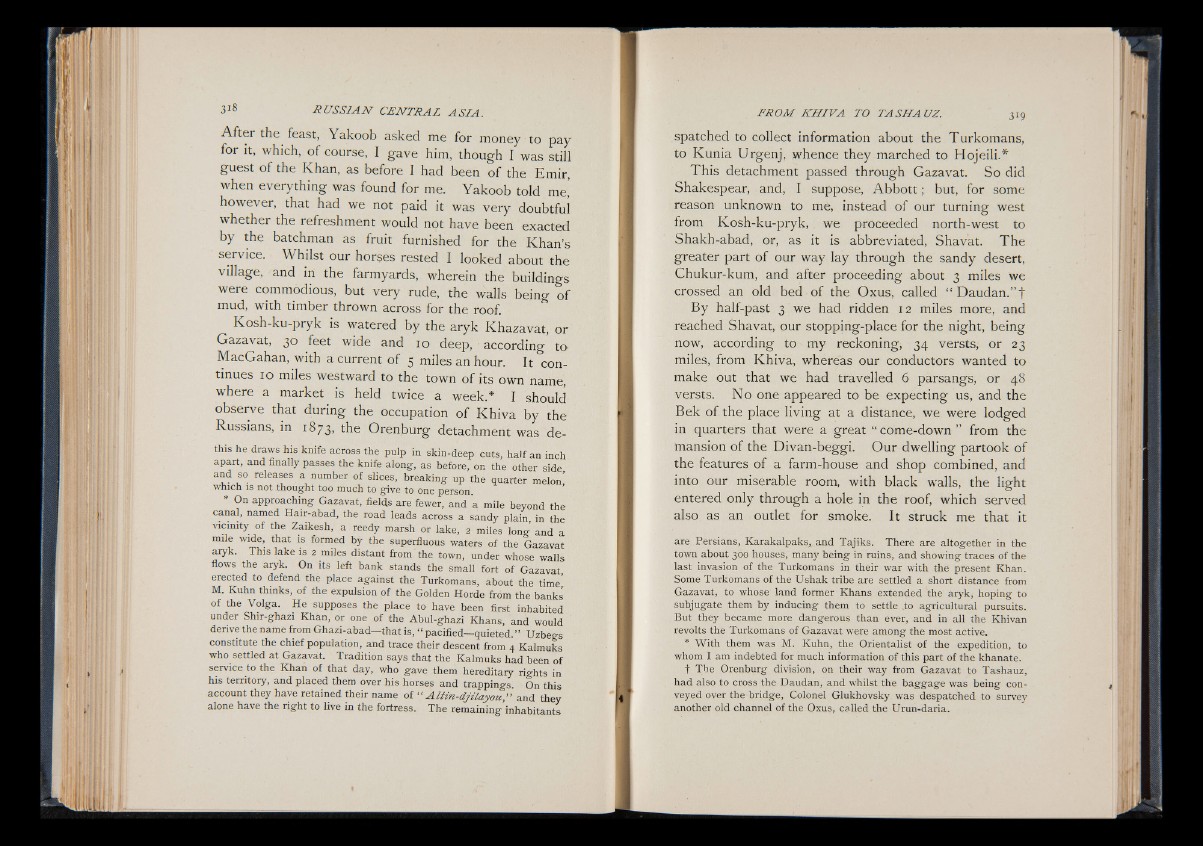
After the feast, Yakoob asked me for money to pay
for it, which, of course, I gave him, though I was still
guest of the Khan, as before I had been o f the Emir,
when everything was found for me. Yakoob told me’
however, that had we not paid it was very doubtful
whether the refreshment would not have been exacted
by the batchman as fruit furnished for the Khan’s
service. Whilst our horses rested I looked about the
village, and in the farmyards, wherein the buildings
were commodious, but very rude, the walls being o f
mud, with timber thrown across for the roof.
Kosh-ku-pryk is watered by the aryk Khazavat, or
Gazavat, 30 feet wide and 10 deep, according to
MacGahan, with a current of 5 miles an hour. It continues
10 miles westward to the town of its own name,
where a market is held twice a week.* I should
observe that during the occupation of Khiva by the
Russians, in 1873, the Orenburg detachment was dethis
he draws his knife across the pulp in skin-deep cuts, half an inch
apart, and finally passes the knife along, as before, on the other side
and so releases a number of slices, breaking up the quarter melon'
which is not .thought too much to give to one person.
On approaching Gazavat, fields are fewer, and a mile beyond the
canal, named Hair-abad, the road leads across a sandy plain, in the
vicinity of the Zaikesh, a reedy marsh or lake, 2 miles long and a
mile wide, that is formed by the superfluous waters of the Gazavat
aryk. This lake is 2 miles distant from the town, under whose walls
flows the aryk. On its left bank stands the small fort of Gazavat
erected to defend the place against the Turkomans, about the time
M. Kuhn thinks, of the expulsion of the Golden Horde from the banks
of the Volga. He supposes the place to have been first inhabited
under Shir-ghazi Khan, or one of the Abul-ghazi Khans, and would
derive the name from Ghazi-abad— that is, “ pacified—quieted.” Uzbegs
constitute the chief population, and trace their descent from 4 Kalmuks
who settled at Gazavat. Tradition says that the Kalmuks had been of
service to the Khan of that day, who gave them hereditary rights in
his territory, and placed them over his horses and trappings. On this
account they have retained their name of “ A ltin-djilayou/’ and they
alone have the right to live in the fortress. The remaining inhabitants
spatched to collect information about the Turkomans,
to Kunia Urgenj, whence they marched to Hojeili.*
This detachment passed through Gazavat. So did
Shakespear, and, I suppose, A b b o tt; but, for some
reason unknown to me, instead of our turning west
from Kosh-ku-pryk, . we proceeded north-west to
Shakh-abad, or, as it is abbreviated, Shavat. The
greater part of our way lay through the sandy desert,
Chukur-kum, and after proceeding about 3 miles we
crossed an old bed of the Oxus, called “ Daudan.” f
By half-past 3 we had ridden 12 miles more, and
reached Shavat, our stopping-place for the night, being
now, according to my reckoning, 34 versts, or 23
miles, from Khiva, whereas our conductors wanted to
make out that we had travelled 6 parsangs, or 48
versts. No one appeared to be expecting us, and the
Bek o f the place living at a distance, we were lodged
in quarters that were a great “ come-down ” from the
mansion of the Divan-beggi. Our dwelling partook of
the features of a farm-house and shop combined, and
into our miserable room, with black walls, the light
entered only through a hole in the roof, which served
also as an outlet for smoke. It struck me that it
are Persians, Karakalpaks,, and Tajiks. There are altogether in the
town about 300 houses, many being in ruins, and showing traces of the
last invasion of the Turkomans in their war with the present Khan.
Some Turkomans of the Ushak tribe are settled a short distance from
Gazavat, to whose land former Khans extended the aryk, hoping to
subjugate them by inducing them to settle .to agricultural pursuits.
But they became more dangerous than ever, and in all the Khivan
revolts the Turkomans of Gazavat were among the most active.
* With them was M. Kuhn, the Orientalist of the expedition, to
whom I am indebted for much information of this part of the khanate.
t The Orenburg division, on their way from Gazavat to Tashauz,
had also to cross the Daudan, and whilst the baggage was being conveyed
over the bridge, Colonel Glukhovsky was despatched to survey
another old channel of the Oxus, called the Urun-daria.